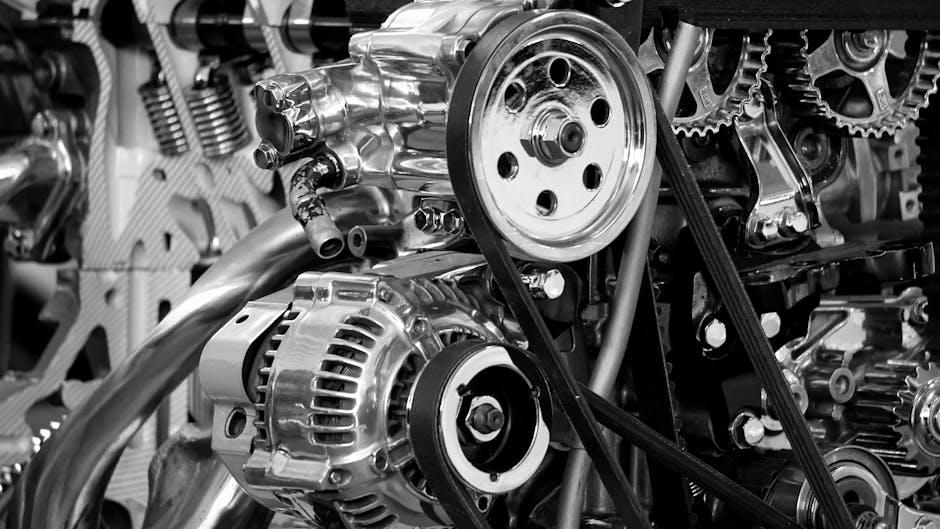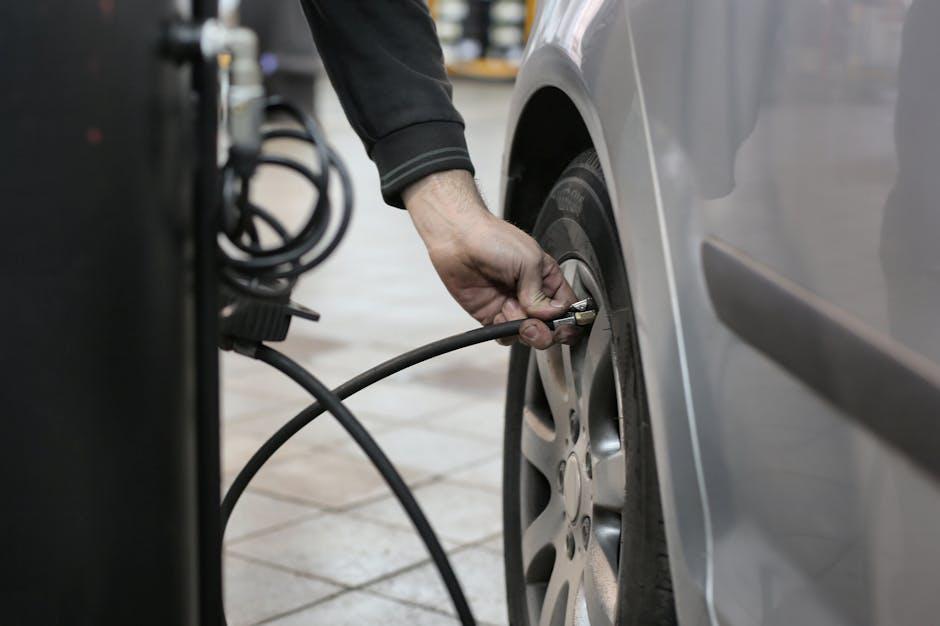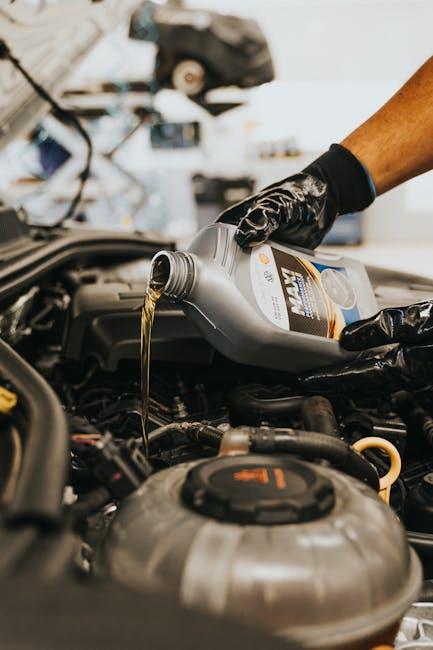Imagine stepping into your car on a hot summer day, greeted by a refreshing breeze that instantly melts away the heat and fatigue. This simple comfort is often taken for granted, yet it hinges on one crucial factor: the health of your car’s air conditioning system. Regular servicing of your car AC isn’t just about maintaining cool air—it’s about ensuring safety, efficiency, and longevity for your vehicle. In this article, we delve into the often-overlooked benefits of routine car AC maintenance, revealing why a well-serviced cooling system is essential for a smooth and comfortable driving experience year-round.
Table of Contents
- The Crucial Role of Car AC Maintenance in Enhancing Performance
- Understanding How Regular Servicing Prevents Costly Repairs
- The Impact of Routine AC Care on Air Quality and Health
- Maximizing Fuel Efficiency Through Proper AC Management
- Essential Checks and Tips for Effective Car AC Servicing
- When to Schedule Your Car AC Service for Optimal Results
- Q&A
- Final Thoughts

The Crucial Role of Car AC Maintenance in Enhancing Performance
Maintaining your car’s air conditioning system goes beyond just comfort—it directly influences your vehicle’s overall performance. A well-serviced AC system ensures optimal airflow, preventing undue strain on the engine and cooling components. When the AC operates efficiently, it minimizes fuel consumption by reducing the load on the engine, thus supporting better mileage and lowering emissions. Moreover, keeping the internal components clean and lubricated helps avoid costly repairs caused by neglected wear and tear, ensuring your drive remains smooth and trouble-free.
Regular inspections and servicing also contribute to a healthier cabin environment. Over time, dust, allergens, and moisture can accumulate inside the AC system, leading to unpleasant odors and potential health risks. Key benefits of timely maintenance include:
- Improved air quality by filtering out harmful particles
- Consistent cooling performance even in extreme weather
- Extended lifespan of the AC compressor and related parts
- Cost savings by preventing major breakdowns
| Maintenance Task | Frequency | Benefit |
|---|---|---|
| Refrigerant Top-Up | Every 1-2 years | Ensures cooling efficiency |
| Filter Replacement | Every 12 months | Improves air purity |
| System Leak Check | Annually | Prevents refrigerant loss |
| Compressor Inspection | As needed | Avoids major mechanical failures |

Understanding How Regular Servicing Prevents Costly Repairs
Preventing major breakdowns starts with routine attention to your vehicle’s AC system. Regular checks allow technicians to spot minor issues such as refrigerant leaks, worn-out belts, or clogged filters before they escalate into expensive repairs. Small fixes like topping up refrigerant or replacing a faulty valve can extend the lifespan of your AC unit, sparing you from the financial burden of compressor replacements or complex duct repairs. Investing a little time and money now means fewer headaches and smoother drives later.
- Detect leaks early to avoid environmental damage and refrigerant loss.
- Replace filters regularly for improved air quality and system efficiency.
- Clean components periodically to prevent wear and corrosion.
Below is a simple comparison illustrating the potential costs involved when servicing is neglected versus when it’s done regularly.
| Service Type | Average Cost | Potential Repair Avoided | Repair Cost if Delayed |
|---|---|---|---|
| Annual AC Servicing | $80 – $120 | Compressor Wear | $700 – $1,200 |
| Filter Replacement | $20 – $50 | Clogged Vents | $150 – $300 |
| Leak Repair | $50 – $100 | Refrigerant Recharge | $200 – $400 |

The Impact of Routine AC Care on Air Quality and Health
Maintaining a car’s air conditioning system goes beyond just cooling comfort; it plays a crucial role in ensuring the air inside your vehicle is clean and health-friendly. Over time, dust, pollen, mold, and other airborne particles accumulate within the AC unit, which can lead to poor air circulation and trigger allergies or respiratory issues for passengers. By scheduling routine servicing, these harmful contaminants are effectively removed, helping to preserve a fresh, breathable environment inside your car. The benefits become clear as regularly cleaned filters and evaporators drastically reduce the presence of irritants, making every journey safer and more pleasant.
Regular AC care can also prevent the buildup of bacteria and unpleasant odors that often arise from moisture and dirt trapped within the system. This not only improves air quality but also supports the overall health of vehicle occupants by minimizing exposure to potentially harmful microorganisms. Below is a quick overview highlighting key advantages of consistent AC maintenance:
| Benefit | Impact |
|---|---|
| Cleaner Air Filters | Reduce dust and allergen levels inside the cabin |
| Mold Prevention | Eliminate odor-causing fungi and bacteria |
| Improved Airflow | Enhance ventilation efficiency and comfort |
| Healthier Environment | Lower risk of respiratory and allergy symptoms |

Maximizing Fuel Efficiency Through Proper AC Management
Efficient air conditioning is not just about comfort; it plays a significant role in optimizing your vehicle’s fuel consumption. When the AC system is well-maintained, the compressor works more smoothly, reducing the workload on your engine. This leads to less fuel being burned as the engine doesn’t have to compensate for an overstrained cooling system. Conversely, a poorly serviced AC can cause the compressor to seize or work inefficiently, dramatically increasing fuel usage due to the added mechanical drag.
To keep your AC system in top fuel-saving condition, consider these smart management tips:
- Use the recirculation mode: This helps cool the cabin faster without overburdening the compressor.
- Park in shaded areas: Reduces initial cooling time, saving fuel by limiting AC use.
- Regularly replace cabin air filters: Ensures better airflow and less strain on the AC unit.
- Schedule timely refrigerant recharges: Maintains optimal cooling efficiency which correlates to fuel economy.
| AC Maintenance Task | Fuel Efficiency Impact |
|---|---|
| Refrigerant Recharge | Up to 10% improvement |
| Compressor Inspection | Prevents fuel waste |
| Filter Replacement | Enhances airflow, saves fuel |

Essential Checks and Tips for Effective Car AC Servicing
Maintaining your car’s air conditioning system goes beyond simply topping up refrigerant; it requires a detailed inspection of every component to ensure optimal performance. Begin with checking the cabin air filter, as a clogged or dirty filter restricts airflow and reduces cooling efficiency. Next, inspect the compressor and belts for any signs of wear or damage, crucial elements that directly affect the AC’s ability to function. Don’t overlook the refrigerant level—too little or too much can cause the system to underperform or even fail. Leak detection is another vital step; even a minor leak can lead to a loss of refrigerant and potential damage to internal components. Finally, assess the system’s drainage to prevent moisture buildup that can cause mold and unpleasant odors.
In addition to the technical checks, following certain practical tips can enhance your car AC’s longevity and effectiveness:
- Run the AC periodically even in cooler months to keep the system lubricated.
- Park your car in the shade whenever possible to reduce the initial heat load on the AC.
- Use recirculation mode during intense heat to cool the cabin faster.
- Schedule regular professional inspections—this simple step saves costly repairs down the road.
| Component | Check Frequency | Action |
|---|---|---|
| Cabin Air Filter | Every 12,000 miles | Replace if dirty |
| Compressor and Belts | Annually | Inspect for wear and damage |
| Refrigerant Level | Every 2 years or as needed | Top up or repair leaks |
| Drainage System | Every 6 months | Clear blockages |

When to Schedule Your Car AC Service for Optimal Results
Timing plays a crucial role in maintaining your car’s air conditioning system at peak performance. Ideally, you should schedule your car AC service once every 6 to 12 months, depending on use and environmental factors. If you live in hot, humid climates or frequently use your AC for long drives, more frequent check-ups can prevent unexpected breakdowns and maintain cooling efficiency. Keep an eye out for early warning signs such as unusual odors, weak airflow, or strange noises, which signal that your system needs immediate attention.
Establishing a regular service routine not only extends the lifespan of your AC components but also improves fuel efficiency and prevents costly repairs. Consider these optimal times for servicing:
- Before summer: Prepare your system for maximum heat by ensuring refrigerant levels and filters are in top shape.
- After winter: Address any moisture buildup or leaks caused by cold weather.
- During routine oil changes: Sync your AC check with other maintenance to save time and cost.
| Service Interval | Ideal Timing | Key Focus |
|---|---|---|
| Every 6 months | During spring and fall | Filter replacement, leaks check |
| Annually | Before summer peak | Refrigerant refill, system flush |
Q&A
Q&A: Unlocking the Benefits of Regular Car AC Servicing
Q1: Why is regular servicing of my car’s air conditioning system important?
A1: Regular servicing ensures your AC system works efficiently, providing cool, clean air during drives. It helps detect and fix minor issues before they escalate, improving comfort and preventing costly repairs.
Q2: How does servicing improve the performance of my car’s AC?
A2: Over time, refrigerant levels drop, filters clog, and components wear out. Servicing replenishes refrigerant, cleans or replaces filters, and checks system integrity, keeping the AC blowing cold and fresh air consistently.
Q3: Can regular AC servicing boost fuel efficiency?
A3: Yes! A well-maintained AC system runs smoothly without putting extra strain on the engine. This translates to less fuel consumption compared to an overworked or leaking AC unit that forces your engine to work harder.
Q4: What health benefits come from maintaining my car’s AC?
A4: Clean air filters and disinfected ducts reduce the buildup of dust, mold, and allergens, promoting better air quality inside your car. This means fewer respiratory irritations and a healthier environment for you and your passengers.
Q5: How often should I get my car’s AC serviced?
A5: Ideally, your car’s AC should be serviced once every year or every 12,000 to 15,000 miles, depending on usage. Consulting your vehicle’s manual and a trusted mechanic helps tailor the schedule to your car’s needs.
Q6: Is regular servicing cost-effective in the long run?
A6: Absolutely. Addressing small issues early prevents expensive breakdowns, prolongs the AC system’s lifespan, and maintains vehicle resale value. Regular servicing is a smart investment for peace of mind and wallet-friendly care.
Q7: What signs suggest my car’s AC needs servicing?
A7: Notice less cooling, strange odors, unusual noises, or water leakage inside the cabin? These are red flags indicating it’s time for a professional AC check-up to restore comfort and functionality.
Q8: Can I service my car AC myself?
A8: While simple filter replacements might be doable, most AC maintenance requires specialized tools and knowledge, such as handling refrigerants safely. It’s best left to certified technicians for thorough and safe servicing.
Regular car AC servicing isn’t just about beating the heat—it’s about maintaining comfort, health, and vehicle efficiency. Treat your car’s climate control like a vital member of your driving team, and it will reward you with fresh, cool rides season after season.
Final Thoughts
In the grand journey of vehicle care, regular car AC servicing often plays the unsung hero. Beyond just cooling your ride, it ensures comfort, enhances efficiency, and extends the lifespan of a vital system. Embracing this simple yet impactful maintenance routine transforms your driving experience from merely getting from point A to B into a smoother, more refreshing voyage. So, as the seasons turn and the miles accumulate, remember: a well-serviced car AC isn’t just about beating the heat—it’s about driving smarter, safer, and with peace of mind.


489 Comments
cnwn3n
cnwn3n
pb8ewc
77h66m
psa7wr
a7i3dc
kkykxu
70h9ym
67aedf
3c4esz
6rqt8e
https://t.me/s/Online_1_xbet/1731
https://t.me/s/Online_1_xbet/3026
https://t.me/s/Official_1xbet_1xbet
https://t.me/rating_online/7
https://t.me/s/rating_online/13
https://t.me/rating_online/4
https://t.me/rating_online/8
https://t.me/rating_online
https://t.me/s/rating_online/6
https://t.me/rating_online/5
https://t.me/rating_online/13
https://t.me/rating_online/6
https://t.me/rating_online/3
https://t.me/rating_online/2
https://t.me/Online_1_xbet/2770
https://t.me/Online_1_xbet/2543
https://t.me/Online_1_xbet/2687
https://t.me/Online_1_xbet/2401
6xrmsm
https://t.me/Online_1_xbet/2196
https://t.me/Online_1_xbet/2954
https://t.me/Online_1_xbet/2411
https://t.me/Online_1_xbet/2002
https://t.me/Online_1_xbet/3342
https://t.me/Online_1_xbet/2847
https://t.me/Online_1_xbet/3045
https://t.me/Online_1_xbet/1806
https://t.me/Official_1xbet_1xbet/s/236
https://t.me/Official_1xbet_1xbet/s/430
https://t.me/Official_1xbet_1xbet/s/932
https://t.me/Official_1xbet_1xbet/s/1413
https://t.me/Official_1xbet_1xbet/s/557
https://t.me/Official_1xbet_1xbet/s/1319
https://t.me/Official_1xbet_1xbet/s/212
https://t.me/Official_1xbet_1xbet/s/1176
https://t.me/Official_1xbet_1xbet/s/948
https://t.me/Official_1xbet_1xbet/s/626
https://t.me/Official_1xbet_1xbet/s/1198
https://t.me/Official_1xbet_1xbet/s/1033
https://t.me/Official_1xbet_1xbet/s/368
https://t.me/Official_1xbet_1xbet/s/915
https://t.me/Official_1xbet_1xbet/s/162
https://t.me/Official_1xbet_1xbet/s/484
https://t.me/Official_1xbet_1xbet/s/1011
https://t.me/Official_1xbet_1xbet/s/1060
https://t.me/Official_1xbet_1xbet/s/466
https://t.me/Official_1xbet_1xbet/s/516
https://t.me/Official_1xbet_1xbet/s/131
https://t.me/Official_1xbet_1xbet/s/555
https://t.me/Official_1xbet_1xbet/s/1186
https://t.me/Official_1xbet_1xbet/s/921
https://t.me/Official_1xbet_1xbet/s/64
https://t.me/Official_1xbet_1xbet/s/1531
https://t.me/Official_1xbet_1xbet/s/1100
https://t.me/Official_1xbet_1xbet/s/360
https://t.me/Official_1xbet_1xbet/s/559
https://t.me/Official_1xbet_1xbet/s/330
https://t.me/Official_1xbet_1xbet/s/1521
https://t.me/Official_1xbet_1xbet/s/483
https://t.me/Official_1xbet_1xbet/s/1458
https://t.me/Official_1xbet_1xbet/s/993
https://t.me/Official_1xbet_1xbet/s/88
https://t.me/Official_1xbet_1xbet/s/1523
https://t.me/Official_1xbet_1xbet/s/717
https://t.me/Official_1xbet_1xbet/s/1025
https://t.me/Official_1xbet_1xbet/s/936
https://t.me/Official_1xbet_1xbet/s/1276
https://t.me/Official_1xbet_1xbet/s/1442
https://t.me/Official_1xbet_1xbet/s/769
https://t.me/Official_1xbet_1xbet/s/1417
https://t.me/Official_1xbet_1xbet/s/384
https://t.me/Official_1xbet_1xbet/s/411
https://t.me/Official_1xbet_1xbet/s/604
https://t.me/Official_1xbet_1xbet/s/1338
https://t.me/Official_1xbet_1xbet/1651
https://t.me/Official_1xbet_1xbet/1737
https://t.me/Official_1xbet_1xbet/1797
https://t.me/s/Official_1xbet_1xbet/1750
https://t.me/Official_1xbet_1xbet/1791
https://t.me/Official_1xbet_1xbet/1609
https://t.me/Official_1xbet_1xbet/1748
https://t.me/Official_1xbet_1xbet/1747
https://t.me/s/Official_1xbet_1xbet/1813
https://t.me/s/Official_1xbet_1xbet/1844
https://t.me/s/Official_1xbet_1xbet/1655
https://t.me/Official_1xbet_1xbet/1619
https://t.me/Official_1xbet_1xbet/1606
https://t.me/s/Official_1xbet_1xbet/1817
https://t.me/s/Official_1xbet_1xbet/1665
https://t.me/Official_1xbet_1xbet/1655
https://t.me/Official_1xbet_1xbet/1705
https://t.me/Official_1xbet_1xbet/1801
https://t.me/s/Official_1xbet_1xbet/1771
https://t.me/Official_1xbet_1xbet/1660
https://t.me/s/Official_1xbet_1xbet/1799
https://t.me/Official_1xbet_1xbet/1615
https://t.me/Official_1xbet_1xbet/1839
https://t.me/Official_1xbet_1xbet/1741
https://t.me/Official_1xbet_1xbet/1761
https://t.me/s/Official_1xbet_1xbet/1602
https://t.me/s/Official_1xbet_1xbet/1607
https://t.me/Official_1xbet_1xbet/1661
https://t.me/Official_1xbet_1xbet/1646
https://t.me/Official_1xbet_1xbet/1814
https://t.me/Official_1xbet_1xbet/1793
https://t.me/Official_1xbet_1xbet/1790
https://t.me/Official_1xbet_1xbet/1852
https://t.me/s/Official_1xbet_1xbet/1826
https://t.me/s/Official_1xbet_1xbet/1832
https://t.me/Official_1xbet_1xbet/1685
https://t.me/Official_1xbet_1xbet/1787
https://t.me/Official_1xbet_1xbet/1764
https://t.me/s/Official_1xbet_1xbet/1726
https://t.me/s/Official_1xbet_1xbet/1731
https://t.me/Official_1xbet_1xbet/1693
https://t.me/s/Official_1xbet_1xbet/1679
https://t.me/s/Official_1xbet_1xbet/1650
https://t.me/Official_1xbet_1xbet/1684
https://t.me/s/Official_1xbet_1xbet/1672
https://t.me/s/Official_1xbet_1xbet/1762
https://t.me/Official_1xbet_1xbet/1602
https://t.me/Official_1xbet_1xbet/1758
https://t.me/Official_1xbet_1xbet/1614
https://t.me/s/Official_1xbet_1xbet/1763
https://t.me/s/Official_1xbet_1xbet/1777
https://t.me/s/Official_1xbet_1xbet/1709
https://t.me/Official_1xbet_1xbet/1850
https://t.me/Official_1xbet_1xbet/1772
https://t.me/s/Official_1xbet_1xbet/1693
https://t.me/s/Official_1xbet_1xbet/1739
https://t.me/Official_1xbet_1xbet/1773
https://t.me/Official_1xbet_1xbet/1728
https://t.me/s/Official_1xbet_1xbet/1742
https://t.me/s/Official_1xbet_1xbet/1819
https://t.me/s/Official_1xbet_1xbet/1738
https://t.me/s/Official_1xbet_1xbet/1696
https://t.me/Official_1xbet_1xbet/1749
https://t.me/s/Official_1xbet_1xbet/1690
https://t.me/Official_1xbet_1xbet/1706
https://t.me/s/Official_1xbet_1xbet/1835
https://t.me/s/Official_1xbet_1xbet/1660
https://t.me/Official_1xbet_1xbet/1712
https://t.me/s/Official_1xbet_1xbet/1633
https://t.me/s/topslotov
ag3ood
https://t.me/s/official_1win_aviator
https://t.me/s/reiting_top10_casino/5
https://t.me/reiting_top10_casino/5
https://t.me/s/reiting_top10_casino/10
https://t.me/s/reiting_top10_casino/4
https://t.me/reiting_top10_casino/10
https://t.me/reiting_top10_casino/7
https://t.me/reiting_top10_casino/6
https://t.me/s/reiting_top10_casino/6
https://t.me/reiting_top10_casino/9
https://t.me/reiting_top10_casino
https://t.me/s/reiting_top10_casino
https://t.me/reiting_top10_casino/3
https://t.me/reiting_top10_casino/2
https://t.me/s/reiting_top10_casino/9
https://t.me/s/reiting_top10_casino/3
https://t.me/s/reiting_top10_casino/2
https://t.me/reiting_top10_casino/4
https://t.me/s/reiting_top10_casino/8
https://t.me/reiting_top10_casino/8
https://t.me/s/Gaming_1xbet
https://t.me/s/PlayCasino_1win
https://t.me/s/PlayCasino_1xbet
https://t.me/s/PlayCasino_1xbet
https://t.me/s/PlayCasino_1win
https://t.me/s/ofitsialniy_1win/33/evith
https://t.me/s/iw_1xbet
https://t.me/s/ofitsialniy_1win
https://t.me/s/Official_beefcasino
41aio6
https://t.me/bs_1xbet/34
https://t.me/s/bs_1xbet/23
https://t.me/s/bs_1xbet/41
https://t.me/bs_1xbet/47
https://t.me/bs_1xbet/21
https://t.me/s/bs_1xbet/38
https://t.me/bs_1xbet/12
https://t.me/s/bs_1xbet/35
https://t.me/bs_1xbet/44
https://t.me/s/bs_1xbet/23
https://t.me/bs_1xbet/49
https://t.me/bs_1xbet/12
https://t.me/s/bs_1xbet/29
https://t.me/s/bs_1xbet/43
https://t.me/s/bs_1xbet/29
https://t.me/s/bs_1xbet/10
https://t.me/bs_1xbet/50
https://t.me/s/bs_1xbet/10
https://t.me/bs_1xbet/22
https://t.me/s/bs_1xbet/49
https://t.me/s/bs_1xbet/44
https://t.me/s/bs_1xbet/4
https://t.me/s/bs_1xbet/15
https://t.me/s/bs_1xbet/39
https://t.me/bs_1xbet/36
https://t.me/s/bs_1xbet/20
https://t.me/bs_1xbet/3
https://t.me/s/bs_1xbet/35
https://t.me/s/bs_1xbet/46
https://t.me/s/bs_1xbet/45
https://t.me/bs_1xbet/45
https://t.me/s/bs_1xbet/46
https://t.me/s/bs_1xbet/39
https://t.me/s/bs_1xbet/47
https://t.me/bs_1xbet/5
https://t.me/bs_1xbet/40
https://t.me/bs_1xbet/39
https://t.me/bs_1xbet/10
https://t.me/s/bs_1xbet/17
https://t.me/bs_1xbet/42
https://t.me/bs_1xbet/31
https://t.me/s/bs_1xbet/3
https://t.me/jw_1xbet/703
https://t.me/jw_1xbet/113
https://t.me/jw_1xbet/568
https://t.me/s/jw_1xbet/543
https://t.me/s/jw_1xbet/697
https://t.me/bs_1Win/1071
https://t.me/bs_1Win/373
https://t.me/bs_1Win/1183
https://t.me/s/bs_1Win/464
https://t.me/bs_1Win/1097
https://t.me/bs_1Win/742
https://t.me/bs_1Win/964
https://t.me/s/bs_1Win/604
https://t.me/s/bs_1Win/430
https://t.me/s/bs_1Win/399
https://t.me/s/bs_1Win/535
https://t.me/bs_1Win/470
https://t.me/Official_mellstroy_casino/19
https://t.me/s/Official_mellstroy_casino/12
https://t.me/Beefcasino_rus/38
https://t.me/s/Official_mellstroy_casino/32
https://t.me/Official_mellstroy_casino/41
https://t.me/Official_mellstroy_casino/13
https://t.me/s/Official_mellstroy_casino/13
https://t.me/Official_mellstroy_casino/14
https://t.me/Official_mellstroy_casino/39
https://t.me/Official_mellstroy_casino/52
https://t.me/s/Official_mellstroy_casino/9
https://t.me/Official_mellstroy_casino/59
https://t.me/Best_promocode_rus/818
https://t.me/Best_promocode_rus/2298
https://t.me/s/Beefcasino_rus/57
https://t.me/s/ud_Legzo/47
https://t.me/ud_Vulkan/50
https://t.me/s/ud_Booi/51
https://t.me/ud_Rox/64
https://t.me/ud_Drip/46
https://t.me/s/ud_PlayFortuna/59
https://t.me/s/ud_Flagman/54
https://t.me/ud_1xSlots/56
https://t.me/ud_MostBet/57
https://t.me/s/ud_Monro/63
https://t.me/ud_Vodka/51
https://t.me/ud_Vodka/61
https://t.me/ud_Pokerdom/51
https://t.me/s/ud_Pinco/52
https://t.me/ud_Pinco/61
https://t.me/Beefcasino_rus/59
https://t.me/s/ud_Starda/45
https://t.me/s/ud_Gama/45
https://t.me/s/ud_Pokerdom/59
https://t.me/s/ud_MostBet/63
https://t.me/ud_Pokerdom/49
https://t.me/ud_CatCasino/57
https://t.me/s/ud_Rox/60
https://t.me/s/ud_Fresh/59
https://t.me/s/ud_Kometa/48
https://t.me/s/ud_1xSlots/17
https://t.me/ud_Drip/19
https://t.me/s/ud_Drip/33
https://t.me/s/UD_VULKAN
https://t.me/s/ud_JoycaSino
https://t.me/s/UD_pinCo
https://t.me/s/uD_dRagonMOneY
https://t.me/s/uD_leoN
https://t.me/s/uD_stArda
https://t.me/s/official_1win_aviator/38
https://t.me/s/uD_fRESH
https://t.me/s/Ud_rIoBet
https://t.me/s/Beefcasino_rus
https://t.me/official_1win_aviator/61
https://t.me/s/Ud_GAMa
https://t.me/s/ud_1XsLOtS
https://t.me/s/Ud_FlagMAN
https://t.me/s/Ud_MRbiT
https://t.me/s/tf_1win
https://t.me/s/tf_1win
https://t.me/s/kta_1win
https://t.me/s/Top_bk_ru
https://t.me/s/ud_monro
https://t.me/s/Ud_LEX
https://t.me/s/official_1win_aviator/52
https://t.me/s/ud_gIZbo
https://t.me/s/ud_rox
https://t.me/s/ud_MRbIt
https://t.me/s/UD_pokeRdOM
https://t.me/s/Ud_StarDa
https://t.me/s/ud_1xSlOtS
https://t.me/s/UD_gGbET
https://t.me/s/uD_Izzi
https://t.me/s/ud_IRwiN
https://t.me/s/Ud_gAMa
https://t.me/s/ke_1Go
https://t.me/s/ke_Gizbo
https://t.me/s/official_1win_aviator/197
https://t.me/s/kef_R7
https://t.me/s/ke_Daddy
https://t.me/s/kef_beef
https://t.me/s/ke_MrBit
https://t.me/s/kef_Lex
https://t.me/s/ke_Pin_Up
https://t.me/s/ke_CatCasino
https://t.me/s/ke_Monro
https://t.me/s/ke_Drip
https://t.me/s/ke_1xSlots
https://t.me/s/ke_MostBet
https://t.me/s/ke_Starda
https://t.me/s/ke_Gama
https://t.me/s/ke_Leon
https://t.me/s/ke_Stake
https://t.me/s/ke_mellstroy
https://t.me/s/ke_Flagman
https://t.me/s/ke_Pokerdom
https://t.me/s/ke_kent
https://t.me/s/ke_PlayFortuna
https://t.me/s/kef_Rox
https://t.me/s/ke_JoyCasino
https://t.me/s/ke_Fresh
https://t.me/s/ke_1Win
https://t.me/s/ke_Vodka
https://t.me/s/ke_Martin
https://t.me/s/ke_Kometa
https://t.me/s/official_1win_aviator/25
https://t.me/s/ke_Casino_X
https://t.me/official_1win_aviator/33
https://t.me/s/ke_GGBet
https://t.me/s/ke_Irwin
https://t.me/s/ke_Pinco
https://t.me/s/ke_DragonMoney
https://t.me/s/ke_Sol
https://t.me/s/ke_Booi
https://t.me/s/official_1win_aviator/570
https://t.me/s/top_kazino_z
https://t.me/s/topcasino_v_rossii
https://t.me/a_Top_onlinecasino/16
https://t.me/a_Top_onlinecasino/9
https://t.me/s/a_Top_onlinecasino/18
https://t.me/s/a_Top_onlinecasino/13
https://t.me/s/a_Top_onlinecasino/10
https://t.me/s/a_Top_onlinecasino/12
https://t.me/a_Top_onlinecasino/18
https://t.me/s/a_Top_onlinecasino/14
https://t.me/a_Top_onlinecasino/10
https://t.me/a_Top_onlinecasino/13
https://t.me/topcasino_rus/
https://t.me/s/official_Legzo_ed
https://t.me/s/official_DragonMoney_ed
https://t.me/s/official_1xSlots_ed
https://t.me/s/official_Lex_es
https://t.me/s/official_Sol_es
https://t.me/s/official_Fresh_ed
https://t.me/s/official_Kent_ed
https://t.me/s/official_Starda_es
https://t.me/s/official_Booi_es
https://t.me/s/official_PinUp_ed
https://t.me/s/official_R7_es
https://t.me/s/official_1xSlots_es
https://t.me/s/official_Jet_es
https://t.me/s/official_Vulkan_es
https://t.me/s/official_Gizbo_es
https://t.me/s/official_Drip_ed
https://t.me/s/official_Daddy_es
https://t.me/s/official_Booi_ed
https://t.me/s/official_Irwin_es
https://t.me/s/official_1Go_es
https://t.me/s/official_PlayFortuna_ed
https://t.me/s/official_Lex_ed
https://t.me/s/official_Vulkan_ed
https://t.me/s/official_Volna_es
https://t.me/s/iGaming_live/4590
https://t.me/s/CasinoX_egs/16
https://t.me/s/Irwin_egs/17
https://t.me/GGBet_egs/7
https://t.me/PinUp_egs/21
https://t.me/s/Flagman_egs/15
https://t.me/s/?@DragonMoney_egs/21
https://t.me/s/Riobet_egs/6
https://t.me/s/GGBet_egs/19
https://t.me/Kometa_egs/3
https://t.me/Starda_egs/19
https://t.me/s/Fresh_egs/17
https://t.me/Jet_egs/21
https://t.me/Stake_egs/8
https://t.me/s/Vodka_egs/20
https://t.me/s/Pokerdom_egs/6
https://t.me/Legzo_egs/19
https://t.me/s/Booi_egs/3
https://t.me/s/PlayFortuna_egs/8
https://t.me/MrBit_egs/5
https://t.me/s/MrBit_egs/18
https://t.me/s/PlayFortuna_egs/11
https://t.me/s/MrBit_egs/14
https://t.me/Jet_egs/22
https://t.me/Martin_egs/12
https://t.me/iGaming_live/4552
https://t.me/s/va_1xbet/3
https://t.me/s/va_1xbet/4
https://t.me/s/va_1xbet/10
https://t.me/s/va_1xbet/18
https://t.me/va_1xbet/13
https://t.me/s/va_1xbet/16
https://t.me/va_1xbet/24
https://t.me/s/va_1xbet/15
https://t.me/va_1xbet/21
https://t.me/va_1xbet/6
https://t.me/va_1xbet/22
https://t.me/s/surgut_narashchivaniye_nogtey/5
https://t.me/surgut_narashchivaniye_nogtey/18
https://t.me/s/surgut_narashchivaniye_nogtey/20
https://t.me/s/rating_online
https://t.me/s/ah_1xbet/20
https://t.me/s/ah_1xbet/14
https://t.me/ah_1xbet/3
https://t.me/ah_1xbet/14
https://t.me/ah_1xbet/13
https://t.me/ah_1xbet/21
https://t.me/s/ah_1xbet/2
https://t.me/s/ah_1xbet/13
https://t.me/ah_1xbet/17
https://t.me/s/ah_1xbet/12
https://t.me/ah_1xbet/19
https://t.me/s/Best_rating_casino
https://t.me/s/reyting_topcazino/12
https://t.me/topcasino_rus/
https://t.me/top_ratingcasino/5
https://t.me/a_Topcasino/5
https://t.me/a_Topcasino/9
https://t.me/top_ratingcasino/10
https://t.me/a_Topcasino/10
https://t.me/a_Topcasino/8
https://t.me/top_ratingcasino/4
https://telegra.ph/Top-kazino-11-14-2
https://t.me/s/kazino_bez_filtrov
https://t.me/kazino_bez_filtrov
https://t.me/da_1xbet/4
https://t.me/da_1xbet/7
https://t.me/da_1xbet/5
https://t.me/da_1xbet/13
https://t.me/da_1xbet/11
https://t.me/da_1xbet/8
https://t.me/da_1xbet/14
https://t.me/da_1xbet/6
https://t.me/Best_promocode_rus/3261
https://t.me/da_1xbet/10
https://t.me/da_1xbet/3
https://t.me/rq_1xbet/1543
https://t.me/rq_1xbet/1507
https://t.me/rq_1xbet/921
https://t.me/s/rq_1xbet/570
https://t.me/s/rq_1xbet/1206
https://t.me/s/rq_1xbet/1122
https://t.me/s/rq_1xbet/1366
https://t.me/s/rq_1xbet/644
https://t.me/s/Official_1xbet1/861
https://t.me/Official_1xbet1/1425
https://t.me/s/Official_1xbet1/852
https://t.me/Official_1xbet1/789
https://t.me/s/Official_1xbet1/482
https://t.me/s/Official_1xbet1/674
https://t.me/s/Official_1xbet1/1181
https://t.me/Official_1xbet1/468